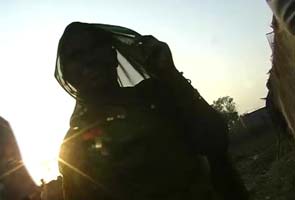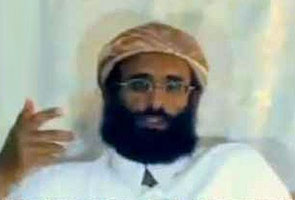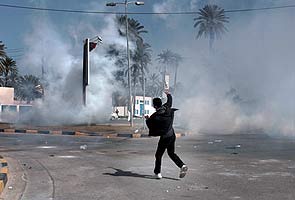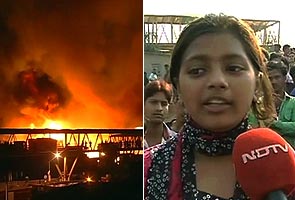Tripoli, Libya: Col. Muammar el-Gaddafi counterattacked with brutal force on Friday, battling rebel forces on two fronts, firing on unarmed protesters in front of international news media and leaving the rebels seeking his ouster in disarray.
His militia's actions seemed likely to stir renewed debate over international intervention to limit his use of military power against his own citizens, possibly by imposing a no-flight zone.
About 30 miles outside the capital, the elite Khamis Brigade, a militia named for the Gaddafi son who commands it, surrounded the rebel-controlled town of Zawiyah and opened fire with mortars, machine guns and other heavy weapons, witnesses said, in two separate skirmishes.
The first was arguably provoked by rebels who tried to attack the better-equipped militia because it was blocking rebel supporters from entering the town, the witnesses said. But the second, described as a "massacre" by rebel witnesses, took aim at a group of unarmed protesters who attempted to march through the militia lines toward the capital.
A rebel making a count at the Zawiyah hospital said that at least 35 rebels and an unknown number of militia soldiers died in the fighting, with more than 60 rebels missing and more than 50 wounded. Among the dead, rebels said, was Col. Hussein Darbouk, a defected Libyan officer who had been commanding rebel forces in the town.
"We killed a lot of their people, but obviously they have more power than us, to be quite honest," said one rebel, who spoke on the condition of anonymity.
Others spoke of violence directed against unarmed civilians.
"I cannot describe the enormity of the violence they are committing against us," one resident said in a telephone interview, with gunfire in the background.
By nightfall there were contradictory reports about the fate of the city. A spokesman for the government said its forces had retaken Zawiyah. "It is liberated this afternoon," said the spokesman, Majid al-Dursi, "and we are going to take you there tomorrow to see for yourself."
But in interviews throughout the night, rebels said they still controlled the city up to its gates, though some said they worried about the night ahead -- especially after midnight, one witness said, after the electricity was cut off and the town went dark.
Around the same time as the afternoon battle in Zawiyah, two truckloads of government security officers showered hundreds of protesters with tear gas in the Tripoli suburb of Tajura. A handful of foreign correspondents and television news crews were in their midst, and many protesters saw their presence as a shield.
"This is the first time they have used gas," one veteran of the protests told a journalist as he retreated. "When you leave they will shoot us with machine guns."
But the militias did not wait. Moments later, with news cameras still rolling, they unleashed bursts of Kalashnikov fire. Sporadic gunfire rang out for over an hour.
A government spokesman later said the militia had fired into the air, but two doctors at the demonstration said that at least two people were wounded. The protesters, who had planned to stage a sit-in at the mosque, quickly scattered.
On the other front in what increasingly appears to be becoming a civil war, rebels fought Colonel Gaddafi's forces in a fierce, daylong battle for the eastern town of Ras Lanuf, the site of a military base and an oil terminal.
The road north of town thundered with explosions, and all day long, trucks mounted with guns and swarming with rebel fighters raced from the city of Brega, about 25 miles to the east, to the front. The better armed Gaddafi forces hammered the rebels with mortars and rocket-propelled grenades, and witnesses said the wounded kept arriving into the night at the Brega hospital.
There was a huge explosion outside Benghazi, the country's second-largest city and the cradle of the revolution. A rebel spokesman said it occurred at an ammunition storage facility, and it was unclear whether the explosion was caused by an airstrike or some other attack, or an accident.
In Tripoli, Internet access was cut off Friday, the traditional day for street protests after midday prayers around the Arab world. Some suspected that Colonel Gaddafi's government may have shut it down to impede organizing and communication by his opponents, just as President Hosni Mubarak of Egypt did before his ouster. Though Libya appears to lack the tech-savvy networks of young people that helped propel the Tunisian and Egyptian revolutions, many Libyan protesters have used the Internet to circulate images of repression.
About 130 foreign journalists have gathered in Tripoli as guests of the Gaddafi government, and in a news conference on Thursday night designed to rebut charges of human rights violations, senior officials of the Foreign Ministry promised them unrestricted freedom of movement.
But on Friday morning, the government informed the journalists that it planned to fly them away from potential Friday protests to a Gaddafi stronghold in the south. When the journalists refused to go, the government temporarily locked them in their hotel, before arranging a bus trip to a central square that is a hub for pro-Gaddafi rallies.
But some journalists, including at least three British television news crews, escaped to a mosque in Tajura where a large demonstration had been held the week before. As men trickled into the mosque for midday prayers, heavily armed checkpoints were already springing up around the neighborhood, with two tanks alongside the main route along the Mediterranean to downtown.
Men entering the mosque said that at least five of their neighbors were killed by Gaddafi militias at a demonstration that brought out thousands here last week, and a doctor displayed cellphone photographs of four bodies severely wounded in the chest, head and eye. "They are experienced shooters," he said.
Many described a rash of midnight abductions as members of the militia searched from house to house for people who participated in past protests. One man said that five households in his family had been raided the same night. A young man described waking in the middle of the night to see a young neighbor being dragged from his home, women crying in the street around him. A third said he believed 100 of his neighbors had been detained in the past week, some released after a couple of days and others still gone. "Every night it is 10 or 15 houses," another said.
Even in the mosque's marble courtyard, some said they feared talking to a foreign journalist. "I am sorry," one whispered. "I can't talk to you. I am from here. Everybody knows me. But, really, we don't like Gaddafi."
Several said they were incensed that Colonel Gaddafi had said in a recent television interview that the Libyan people loved him. "We want to show that the number of people who hate Gaddafi is more," one said.
This week, several said, they had planned to pull back or stay in the mosque for a sit-in rather than risk an ambush or shootings at a march toward downtown. "It is impossible to advance here because you are faced with heavy gunfire," one man said.
Another said the plan had come from Benghazi. "Our government is in Benghazi now for all Libya," he said.
A plainclothes police officer introduced himself and demanded the names and news organizations of journalists present.
When the thousands of men who had prayed at the mosque began to file out around 1:45 p.m., a group of young men stood facing the door carrying the tri-colored pre-Gaddafi Libyan flag and chanting for others to demonstrate: "The blood of the martyrs will not be wasted." Anticipating foreign news media, a young man unfurled a banner in English: "No more killing. Peaceful protests."
But instead of rallying inside the relative safety of the mosque's large marble courtyard, the energized crowd quickly surged through the gates to a nearby roundabout, where protesters had been killed the week before. One man said his son was detained by security forces 10 days ago, and he was warned that if he protested he might never see him again.
"Even if he kills too many people, we will still do what we do," another vowed. "He is killing us for 41 years."
As cameramen scurried for the best angle, several thanked journalists for shielding them. "It is just because of the media we are safe," one said. "If you were not here we would see people killed."
By the time the crowd from the mosque reached the roundabout only about 300 protesters remained, the threats and detentions having done their work. The protesters lamented that militia roadblocks prevented others from joining them from other mosques.
Some said they were refraining from taking cellphone pictures of the demonstrations, since those doing so were now suspected of being government spies, taking pictures of protesters so the government can track them down.
At 2:45, two blue trucks packed with police officers bearing Kalashnikovs appeared at the end of the block.
Moments later, tear gas canisters were flying through the air and the crowd began to stampede. "Mosque, mosque!" some shouted, urging the whole crowd to retreat to its relative safety. Few listened.
Braving the gas and Kalashnikovs, some young men picked up stones to hurl at the militia. Then the militia opened fire. Their initial aim was unclear. But by then they had occupied the roundabout, blocking the way back to the mosque.
Journalists scattered, too, some taking refuge in private homes or businesses as heavily armed militia checkpoints locked down the neighborhood.
Around 2:00 a.m., several volleys of gunfire crackled over the capital. A long caravan of white double-cabin Toyota Tundra pick-up trucks, the vehicle of choice for pro-Gaddafi militias, was cruising through the streets, apparently firing their weapons in celebration of day's success
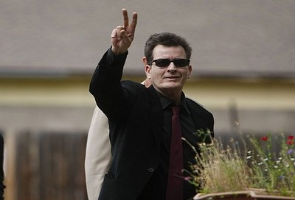


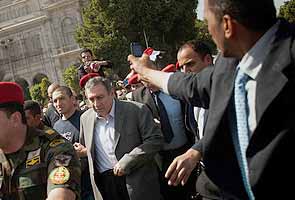

 Click to Expand & Play
Click to Expand & Play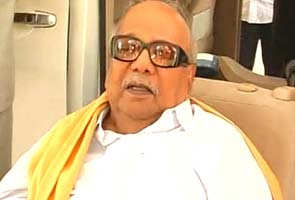
 The bus carrying the West Indies players has been stoned on its way back to the team hotel after they thrashed Bangladesh by nine wickets in Mirpur. There were no injuries, the team management confirmed to ESPNcricinfo, and both squads were safely back at the hotel but the players were shaken.
The bus carrying the West Indies players has been stoned on its way back to the team hotel after they thrashed Bangladesh by nine wickets in Mirpur. There were no injuries, the team management confirmed to ESPNcricinfo, and both squads were safely back at the hotel but the players were shaken.